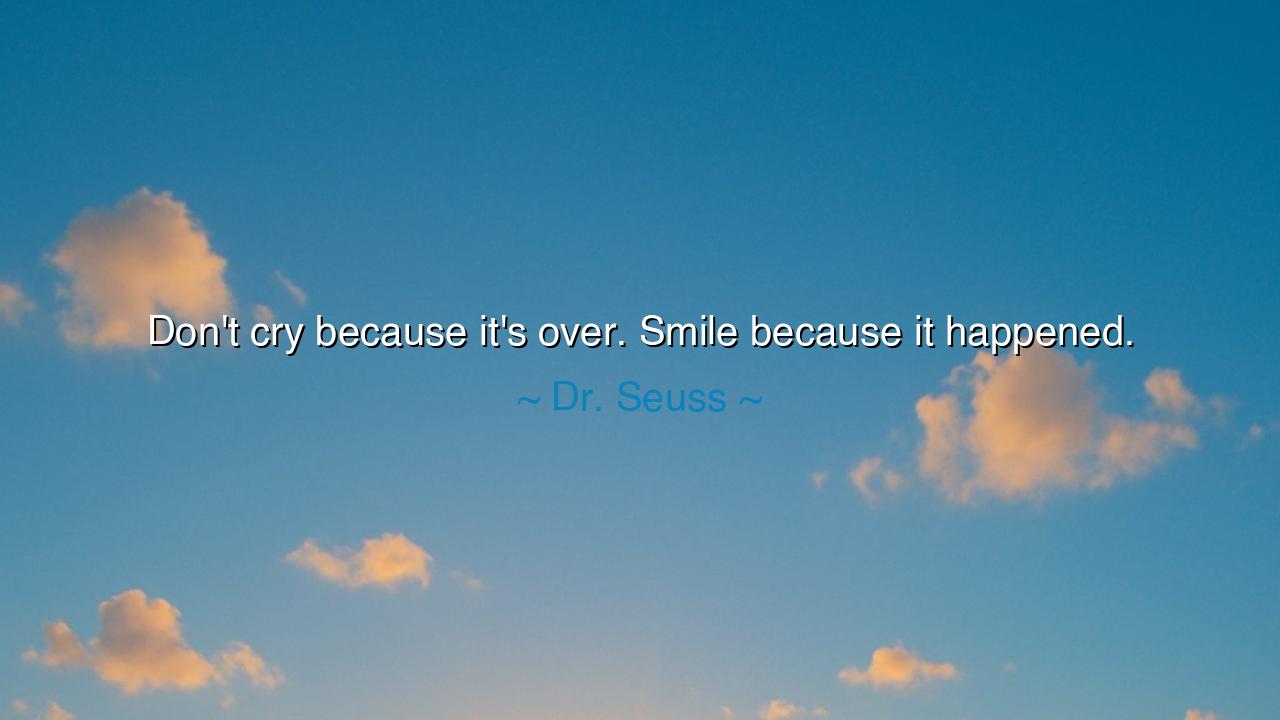
Don't cry because it's over. Smile because it happened.






The words of Dr. Seuss—“Don’t cry because it’s over. Smile because it happened.”—resound like a gentle hymn of gratitude, cloaked in the simplicity of a children’s author yet carrying the weight of timeless wisdom. They remind us that all things in this life are fleeting: moments, seasons, loves, triumphs, and even sorrows. To lament their passing is natural, but to dwell in grief is to miss the treasure they left behind. The smile, born from remembrance, transforms loss into celebration, teaching the soul to bow in gratitude rather than sink in despair.
The ancients would have called this the art of embracing impermanence. Life is not a chain of possessions to be hoarded, but a stream of experiences flowing ever forward. To cry because the waters have passed is to clutch at what cannot be held. But to smile is to honor the river for having flowed at all, to recognize that the gift was never meant to last forever but to touch us for a time. Thus, Dr. Seuss, in his whimsical way, speaks the same truth that sages and poets of old have whispered: cherish the moment, for its beauty lies in its passing.
Consider the story of Lou Gehrig, the baseball hero who, upon learning of his fatal illness, stood before a stadium of fans and declared himself “the luckiest man on the face of the earth.” Though his career and his life were ending far too soon, he chose not to cry because it was over. He chose to smile because it happened—to be grateful for the years of triumph, the cheers of the crowd, the friendships and victories that had graced his life. His courage transformed tragedy into testimony, teaching generations that gratitude is stronger than grief.
Dr. Seuss himself lived in a world of imagination, where endings and beginnings flowed seamlessly. His words, though written in the playful style of a children’s rhyme, arose from the wisdom of one who had seen much of life’s impermanence. He knew that childhood ends, stories close, and days slip into the past, yet each moment carries its eternal gift. In his way, he offered humanity a gentle shield against sorrow: the reminder that the memory of joy is itself a lasting treasure.
This teaching does not deny the tears. To cry at endings is human, for love and joy leave their mark upon us. But the wisdom lies in not remaining in grief. After the tears have fallen, the heart is called to smile—to lift itself by remembering the good that was given. The smile does not erase loss, but it redeems it. It transforms “what is gone” into “what was blessed,” and in this way, grief becomes gratitude, and sorrow becomes strength.
The lesson for us is clear: meet endings with gratitude, not despair. When you finish a season of life, a friendship, a journey, or even a day, do not cling only to the pain of parting. Choose instead to remember the beauty of what was lived. Carry it forward as nourishment for the soul, as inspiration for new beginnings. For every ending is also a seed, and gratitude waters it into new life.
Practically, this means pausing at every farewell—not only to weep, but to give thanks. Write down the joys of what has passed. Speak aloud your gratitude to those who shared the moment. Let your face soften into a smile, even through tears, as a gesture of remembrance. This practice transforms the heart, teaching it to look upon life not as a series of losses, but as a garden of blessings, each flower fading yet leaving fragrance behind.
Thus, Dr. Seuss’s words endure as both comfort and command: “Don’t cry because it’s over. Smile because it happened.” Take them into your soul. For the day will come when chapters close, when voices fade, when doors are shut behind you. In that moment, let gratitude be your response. Smile through the veil of tears, and you will carry the memory not as a wound, but as a gift, lighting your path into the future.






AAdministratorAdministrator
Welcome, honored guests. Please leave a comment, we will respond soon